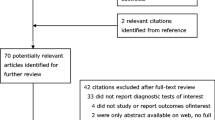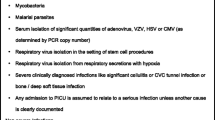Abstract
Febrile neutropenia (FN) requires immediate use of antibiotics (ATB), and procalcitonin (PCT) is proven to be useful in guiding antibiotic therapy in different settings. This study investigated the use of PCT as a guide for the duration of ATB in FN. A randomized controlled trial was carried out from January–December 2010. A total of 62 hematological adult patients with FN were randomized, in 1:1 ratio, into two groups: (1) PCT group: length of ATB guided by institutional protocol plus PCT dynamics, and (2) control group: duration of ATB in accordance with institutional protocol. There was no difference between groups regarding the use of ATB for the first episode of fever (HR 1.14, 95 % CI 0.66–1.95, p = 0.641), with equivalent median duration of ATB therapy (PCT group 9.0 days and control group 8.0 days, p = 0.67), and median number of days without ATB (0 days, IQR 0–2 days for both groups, p = 0.96). We observed no difference in clinical cure rate (p = 0.68), infection relapse (p = 1.0), superinfection (p = 0.85), length of hospitalization (p = 0.64), and mortality at 28 days (p = 0.39) and at 90 days (p = 0.72). Considering the cut-off of 0.5 ng/ml, PCT was correlated with bacteremia (sensitivity of 51.9 % and specificity of 76.5 %). In this randomized controlled trial, adding a PCT-guided protocol to the standard recommendations did not reduce the use of antibiotics in febrile neutropenia, although no apparent harm was caused. PCT proved to be a marker of bacteremia in this setting.



Similar content being viewed by others
References
Sakr Y, Sponholz C, Tuche F, Brunkhorst F, Reinhart K (2008) The role of procalcitonin in febrile neutropenic patients: review of the literature. Infection 36:396–407
Bodey GP (2009) The changing face of febrile neutropenia-from monotherapy to moulds to mucositis. Fever and neutropenia: the early years. J Antimicrob Chemother 63(Suppl 1):i3–13
Klastersky J, Awada A, Paesmans M, Aoun M (2011) Febrile neutropenia: a critical review of the initial management. Crit Rev Oncol Hematol 78:185–194
Cornillon J, Bouteloup M, Lambert C (2011) Evaluation of procalcitonin and CRP as sepsis markers in 74 consecutive patients admitted with prolonged febrile neutropenia. J Infect 63:93–95
Freifeld AG, Bow EJ, Sepkowitz KA et al (2011) Clinical practice guideline for the use of antimicrobial agents in neutropenic patients with cancer: 2010 update by the infectious diseases society of america. Clin Infect Dis 52:e56–e93
Penack O, Buchheidt D, Christopeit M et al (2011) Management of sepsis in neutropenic patients: guidelines from the infectious diseases working party of the German Society of Hematology and Oncology. Ann Oncol 22:1019–1029
Tamura K (2005) Clinical guidelines for the management of neutropenic patients with unexplained fever in Japan: validation by the Japan Febrile Neutropenia Study Group. Int J Antimicrob Agents 26(Suppl 2):S123–7, discussion S133-40
Gea-Banacloche J (2011) Biomarkers in fever and neutropenia: a solution in search of a problem? Crit Care Med 39:1205–1206
Schuetz P, Briel M, Christ-Crain M et al (2012) Procalcitonin to guide initiation and duration of antibiotic treatment in acute respiratory infections: an individual patient data meta-analysis. Clin Infect Dis 55:651–662
Agarwal R, Schwartz DN (2011) Procalcitonin to guide duration of antimicrobial therapy in intensive care units: a systematic review. Clin Infect Dis 53:379–387
Engel A, Steinbach G, Kern P, Kern WV (1999) Diagnostic value of procalcitonin serum levels in neutropenic patients with fever: comparison with interleukin-8. Scand J Infect Dis 31:185–189
Gac AC, Parienti JJ, Chantepie S et al (2011) Dynamics of procalcitonin and bacteremia in neutropenic adults with acute myeloid leukemia. Leuk Res 35:1294–1296
Hambach L, Eder M, Dammann E et al (2002) Diagnostic value of procalcitonin serum levels in comparison with C-reactive protein in allogeneic stem cell transplantation. Haematologica 87:643–651
Jimeno A, García-Velasco A, del Val O et al (2004) Assessment of procalcitonin as a diagnostic and prognostic marker in patients with solid tumors and febrile neutropenia. Cancer 100:2462–2469
Kitanovski L, Jazbec J, Hojker S, Gubina M, Derganc M (2006) Diagnostic accuracy of procalcitonin and interleukin-6 values for predicting bacteremia and clinical sepsis in febrile neutropenic children with cancer. Eur J Clin Microbiol Infect Dis 25:413–415
Koivula I, Juutilainen A (2011) Procalcitonin is a useful marker of infection in neutropenia. Leuk Res 35:1288–1289
Persson L, Engervall P, Magnuson A et al (2004) Use of inflammatory markers for early detection of bacteraemia in patients with febrile neutropenia. Scand J Infect Dis 36:365–371
Robinson JO, Lamoth F, Bally F, Knaup M, Calandra T, Marchetti O (2011) Monitoring procalcitonin in febrile neutropenia: what is its utility for initial diagnosis of infection and reassessment in persistent fever? PLoS One 6:e18886
Ruokonen E, Nousiainen T, Pulkki K, Takala J (1999) Procalcitonin concentrations in patients with neutropenic fever. Eur J Clin Microbiol Infect Dis 18:283–285
Secmeer G, Devrim I, Kara A et al (2007) Role of procalcitonin and CRP in differentiating a stable from a deteriorating clinical course in pediatric febrile neutropenia. J Pediatr Hematol Oncol 29:107–111
von Lilienfeld-Toal M, Dietrich MP, Glasmacher A et al (2004) Markers of bacteremia in febrile neutropenic patients with hematological malignancies: procalcitonin and IL-6 are more reliable than C-reactive protein. Eur J Clin Microbiol Infect Dis 23:539–544
Giamarellos-Bourboulis EJ, Grecka P, Poulakou G, Anargyrou K, Katsilambros N, Giamarellou H (2001) Assessment of procalcitonin as a diagnostic marker of underlying infection in patients with febrile neutropenia. Clin Infect Dis 32:1718–1725
Giamarellou H, Giamarellos-Bourboulis EJ, Repoussis P et al (2004) Potential use of procalcitonin as a diagnostic criterion in febrile neutropenia: experience from a multicentre study. Clin Microbiol Infect 10:628–633
De Pauw B, Walsh TJ, Donnelly JP et al (2008) Revised definitions of invasive fungal disease from the European organization for research and treatment of cancer/invasive fungal infections cooperative group and the national institute of allergy and infectious diseases mycoses study group (EORTC/MSG) consensus group. Clin Infect Dis 46:1813–1821
National Cancer Institute. Common Terminology Criteria for Adverse Events (CTCAE), version 4.0. Available at: http://evs.nci.nih.gov/ftp1/CTCAE/CTCAE_4.03_2010-06-14_QuickReference_8.5x11.pdf. Accessed 12 Mar 2013
Klastersky J, Paesmans M, Rubenstein EB et al (2000) The multinational association for supportive care in cancer risk index: a multinational scoring system for identifying low-risk febrile neutropenic cancer patients. J Clin Oncol 18:3038–3051
Pizzo PA, Armstrong D, Bodey G et al (1990) From the immunocompromised host society: the design, analysis, and reporting of clinical trials on the empirical antibiotic management of the neutropenic patient. J Infect Dis 161:397–401
Nobre V, Harbarth S, Graf JD, Rohner P, Pugin J (2008) Use of procalcitonin to shorten antibiotic treatment duration in septic patients: a randomized trial. Am J Respir Crit Care Med 177:498–505
Robinson JO, Calandra T, Marchetti O (2005) Utility of procalcitonin for the diagnosis and the follow-up of infections in febrile neutropenic patients. Rev Med Suisse 1:878–886
Schuetz P, Albrich W, Mueller B (2011) Procalcitonin for diagnosis of infection and guide to antibiotic decisions: past, present and future. BMC Med 9:107
Acknowledgments
We would like to thank the patients, medical, nursing, and laboratory staff of the Hospital das Clínicas and School of Medicine of the Universidade Federal de Minas Gerais. We are indebted to Prof. Stephan Harbarth whose encouragement and counseling made this study possible.
Author information
Authors and Affiliations
Corresponding author
Ethics declarations
Ethical aspects
The Institutional Ethics Review Board approved the study protocol, and written informed consent was obtained from all participants.
Funding
This work was supported by Fundação de Amparo à Pesquisa do Estado de Minas Gerais (APQ-01956-10).
Conflict of interest
The authors declare that they have no conflict of interest.
Rights and permissions
About this article
Cite this article
Lima, S.S.S., Nobre, V., de Castro Romanelli, R.M. et al. Procalcitonin-guided protocol is not useful to manage antibiotic therapy in febrile neutropenia: a randomized controlled trial. Ann Hematol 95, 1169–1176 (2016). https://doi.org/10.1007/s00277-016-2639-5
Received:
Accepted:
Published:
Issue Date:
DOI: https://doi.org/10.1007/s00277-016-2639-5




